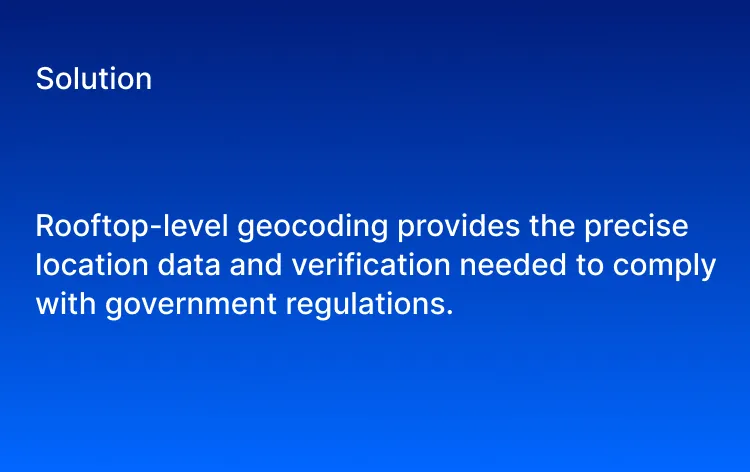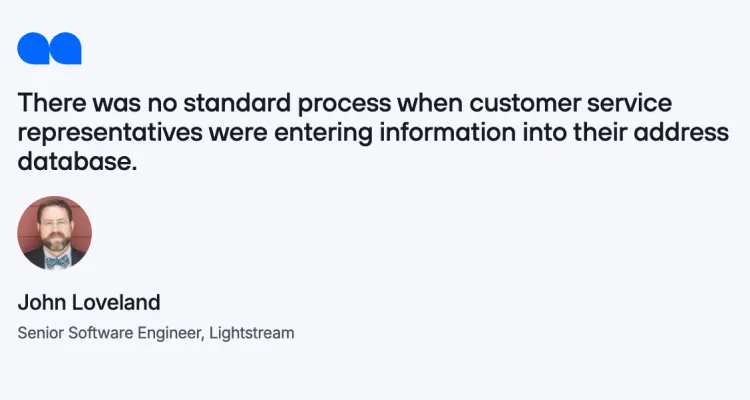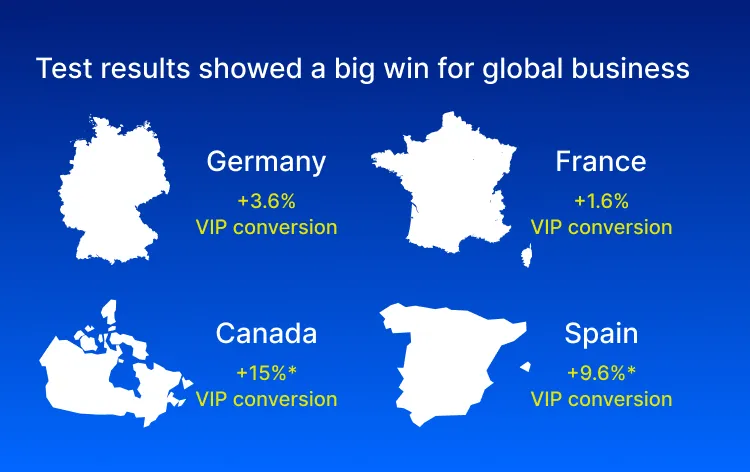How address data became Fabletics's (and others') secret sauce


Address data accuracy isn't just about getting mail delivered. Having quality address data will directly impact revenue, compliance, and customer experience. In a recent webinar, we explored real-world case studies showing how companies across industries leverage address verification and geocoding to solve expensive problems and unlock new opportunities.
Healthcare data: Compliance and accuracy at scale
Curatus, a healthcare data provider, faced a critical challenge with provider directory accuracy. Nearly 45% of directory locations contained inaccurate information, and duplicate addresses plagued their system, sometimes showing 333 instances of the same provider. For healthcare companies, this is both inconvenient and creates serious compliance risks with government regulations.

By implementing rooftop geocoding with address verification, Curatus improved their location data quality by 15%. The solution provides suite-level accuracy, ensuring patients can find the exact doctor's office location rather than just the general building. This precision matters significantly when dealing with medical facilities that may house dozens of different practices.
Insurance: Risk assessment down to the rooftop
HIPPO, a property and casualty insurance company, needed precise location data for pre-construction risk assessment, particularly for coastal properties in Florida. The challenge involved ensuring individual homes that might share the same address but represent vastly different risk profiles.

Using rooftop geocoding, HIPPO can pinpoint exact roof locations rather than relying on general parcel data. This precision enables more accurate risk modeling and premium pricing. Consider the difference between a home 85 feet from a fire hydrant versus one 100 feet away. That distance directly impacts insurance rates because it affects response times and fire suppression capabilities.
Telecommunications: Data cleansing for better operations
Lightstream tackled a common but costly problem: incomplete address data in their customer database. Missing secondary address information like apartment numbers, suite numbers, or lobby designations created operational headaches and increased costs.

Through systematic address verification and data cleansing, Lightstream corrected 10-15% of their address database. This process involved fixing typos, adding missing secondary indicators, and consolidating duplicate entries. Regular data cleansing—ideally more frequently than quarterly—prevents these issues from accumulating and becoming more expensive to resolve later.
Banking: Serving underserved markets
Majority, a finance company serving immigrants to the United States, faced unique challenges. Their customer base often lacks traditional identification like Social Security numbers, making address verification crucial for know-your-customer processes and secure banking operations.
The company struggled with misdelivered debit cards, which created frustrated customers and caused expensive reissuance costs. After switching to Smarty's address verification and autocomplete services, Majority saw a 70% decrease in misdelivered cards. The solution handles alias locations, or other situations where the same location might have multiple valid names, ensuring mail reaches the intended recipient regardless of which address variation is used.
Ecommerce: Mobile experience and global expansion
Fabletics, the athleisure brand, prioritized mobile user experience as customers increasingly shop on phones rather than computers. Their subscription-based model requires customers to complete forms and quizzes, making address entry efficiency critical for conversion rates.
By implementing both US and international address verification with autocomplete, Fabletics saw significant conversion improvements across global markets: 1.6% increase in France, 9.2% in Canada, and notable gains in Germany and Spain. For enterprise brands, even a 1% conversion improvement represents substantial revenue impact.

The mobile optimization proved particularly valuable. Customers can quickly select from autocomplete suggestions rather than typing full addresses on small screens, while real-time verification catches errors immediately with user-friendly prompts to confirm corrections.
Technical implementation insights
Rooftop vs. parcel geocoding: Standard verification provides ZIP+4 level accuracy (covering 5-10 houses), while rooftop geocoding delivers precise building-level coordinates. For risk assessment, delivery routing, or compliance applications, this precision difference can be worth significant money.
Alias locations and Smarty keys: The same physical location might have multiple valid addresses due to street name changes, numbering updates, or administrative variations. Smarty Keys provide a unique identifier that connects all address variations to the same location, enabling accurate data consolidation across different sources.
Postal vs. non-USPS addresses: Companies can configure their systems to include only USPS-deliverable addresses or expand to include locations served by other carriers like FedEx or UPS. This flexibility ensures package delivery while accommodating remote or specialized delivery situations.
Customizable user experience: The verification and autocomplete APIs can be configured to match company branding and specific workflow needs. Some companies display autocomplete suggestions immediately, others verify after form submission, and some combine both approaches for optimal user experience.
Key takeaways
Address data quality directly impacts multiple business metrics: customer satisfaction, operational costs, regulatory compliance, and revenue conversion. The most successful implementations combine multiple address services to create comprehensive solutions tailored to specific business needs.
Regular data maintenance proves more cost-effective than periodic large-scale cleanups. Companies that implement real-time address verification during data entry prevent problems before they accumulate, while those that cleanse existing databases can typically improve 10-15% of their address records.
Address accuracy becomes even more critical for businesses operating globally or serving mobile-first customers. International customers expect localized, efficient address entry experiences, while mobile users abandon forms that are difficult to complete on small screens.


